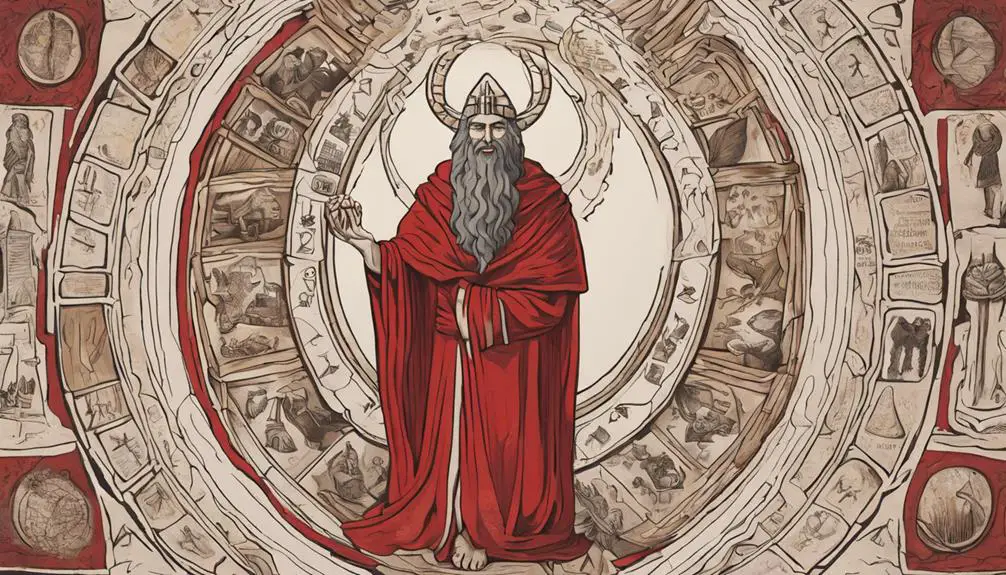Find out how Reuben and Paul's transformative journeys in the Bible offer fascinating insights into personal growth and redemption.

Reuben and Paul in the Bible
Isn't it intriguing how Reuben, the firstborn of Jacob, and Paul, the Apostle, both underwent significant transformations in the Bible?
You may have encountered their stories multiple times, but have you ever really considered the implications of their changes?
They were men who transitioned from questionable character to redemption, making their narratives more than just historical accounts.
Their lives offer profound insights into human nature, failure, and the power of transformation.
Wouldn't you want to know more about how their journeys can shed light on your own personal growth?
Key Takeaways
- Reuben's life in the Bible underscores the themes of responsibility, consequences, and God's justice, particularly through his loss and restoration of honor.
- Reuben's evolution from an unreliable figure to a responsible guardian shows the transformative power of repentance and maturity.
- Paul's life highlights the transformative power of divine grace, moving from a zealous persecutor of Christians to one of the faith's most influential apostles.
- Both Reuben and Paul's stories in the Bible demonstrate the importance of willingness to change, learn, and evolve for personal growth and spiritual redemption.
Understanding Reuben's Biblical Significance

To fully grasp the biblical significance of Reuben, one must delve into his story as it unfolds in the Old Testament. Reuben, the firstborn of Jacob and Leah, holds a unique position in biblical history. His birthright, 'Reuben's Inheritance', carries significant implications. As the eldest, he was entitled to certain privileges, including a double portion of his father's wealth and leadership over his siblings.
However, Reuben's actions resulted in a dramatic shift in his fortunes. He lost his birthright due to his indiscretion with Bilhah, his father's concubine. This incident not only altered his personal status but also impacted the 'Tribe of Reuben'.
Though the tribe received a land portion during the conquest of Canaan, it wasn't as prestigious as other tribes' territories. Situated east of the Jordan River, their land was fertile but vulnerable to foreign invasions. The tribe's diminished status, reflected in their inheritance, is a direct consequence of Reuben's personal failings.
Thus, understanding Reuben's story helps illuminate broader themes of responsibility, consequences, and divine justice in the Old Testament. It's a reminder that actions carry weight, and decisions made can dramatically impact not only one's life but also the fate of subsequent generations.
Key Events in Reuben's Life

Examining the pivotal moments in Reuben's life can further illuminate the complexities of his character and his profound influence on biblical narratives. As the eldest son of Jacob and Leah, Reuben was born into a position of privilege. However, his birthright was lost due to a serious transgression, which deeply impacted his life.
Event |
Implication |
|---|---|
Reuben's Birth |
As the firstborn, he was entitled to leadership and a double inheritance. |
Reuben's Transgression |
He dishonored his father by sleeping with Bilhah, leading to the loss of his birthright. |
Reuben's Repentance |
After selling Joseph, he was the first to show regret and tried to save him. |
Reuben's Birthright Loss |
His birthright was given to Joseph's sons, signifying his diminished status. |
Reuben's Blessing |
Jacob's final words to him were a mixture of rebuke and blessing, reflecting his complex character. |
Reuben's repentance is a key aspect of his character arc. Despite his transgressions, he showed a capacity for remorse and change. Through these events, one can understand the depth of Reuben's character and his consequential role in the biblical narrative.
Unraveling Paul's Persecution Period

Delving into the period of Paul's persecution, you'll find a transformative chapter in the Apostle's life that significantly shaped his ministry and teachings in the New Testament.
From the persecutor's perspective, Paul, then known as Saul, was a zealous Pharisee. He pursued followers of the 'Way,' arresting them, and endorsing their execution. His actions were driven by a fervent belief that he was preserving the purity of Jewish religion. This context is crucial to grasp Paul's motivations during this period.
Paul saw himself as an upholder of the Mosaic Law, viewing the new Christian movement as a heretical sect that jeopardized the very core of Judaism. His fervor wasn't rooted in personal malice, but in a profound sense of duty to protect his faith. His actions, harsh as they were, stemmed from a place of religious conviction and zealous commitment to uphold religious law.
Yet, it's this very intensity that would later fuel his devotion to spreading the Gospel. In the irony of his journey, Paul's persecution period became a catalyst for his eventual transformation. It's the paradox of Paul's life – the persecutor turned preacher – that makes his story so compelling and pivotal within the New Testament narrative.
Paul's Conversion and Its Implications

In understanding Paul's conversion, you'll find it to be a defining moment that not only changed his life but also had profound implications for Christianity as a whole. Saul's transformation into Paul on the road to Damascus is a pivotal episode in the New Testament. Prior, Saul was a zealous persecutor of Christians, but this miraculous encounter with Jesus led to his rebirth as Paul, an apostle dedicated to spreading the teachings of Christ.
The conversion impact is immense and far-reaching. Firstly, it demonstrates the power of God's grace to transform even the most hardened of hearts. Secondly, Paul's subsequent teachings and writings, many of which form the core of the New Testament, shaped Christian doctrine and the Church's development. His interpretation of Jesus' teachings played a significant role in making Christianity more accessible to non-Jews, thus contributing to its spread.
Lessons From Reuben and Paul's Lives

Drawing parallels between Reuben and Paul's lives offers deep insights into their respective journeys and the timeless lessons they impart. You'll notice a distinct character evolution for both, guided by divine intervention.
Reuben, the eldest of Jacob's twelve sons, wasn't always the most reliable. He made some grave errors, like interfering in his father's marital affairs. But over time, he evolved into a responsible figure. He offered himself as a guarantee for Benjamin's safety, demonstrating a maturity that came from facing his past mistakes.
Paul, on the other hand, started as Saul, a notorious persecutor of Christians. But divine intervention on the road to Damascus transformed him into Paul, the apostle. He became a fervent follower of Christ, his life an epitome of redemption.
These narratives teach you that, regardless of past mistakes, you can evolve positively. They show that divine intervention, in different forms, can guide this evolution. But ultimately, it's your willingness to change that matters. Remember, it's never too late to rectify, learn, and grow. Use Reuben and Paul's examples as inspirations to face your own challenges and evolve.
Frequently Asked Questions
What Was the Relationship Between Reuben and Paul in the Bible?
You're mistaken. There's no direct relationship between Reuben and Paul in the Bible. Reuben's redemption and Paul's conversion are separate events within the scripture.
Reuben, Jacob's first-born, sought to save Joseph, showing a redemption of sorts. Conversely, Paul's conversion on the road to Damascus is a transformative event in the New Testament. They don't intersect or interact in biblical narratives.
Are There Any Specific Prophecies Related to Reuben and Paul in the Bible?
You're asking about specific prophecies related to Reuben and Paul in the Bible. There's no prophecy directly connecting them. However, you'll find individual ones.
Reuben's redemption is hinted in Jacob's blessings in Genesis 49. Paul's conversion, on the other hand, doesn't fulfill a prophecy but is a significant event prophesied to Ananias in Acts 9.
How Are the Teachings of Reuben and Paul Relevant to Modern Christianity?
You're exploring the modern interpretation and doctrinal impact of biblical teachings. The relevance of these teachings to modern Christianity lies in their timeless messages.
They provide guidance on morality, ethics, faith, and spirituality. They're not simply historical texts, but living documents that continue to influence Christian thought and practice today.
They inspire modern Christians to lead lives of humility, service, and devotion. The teachings are interpreted in light of current societal contexts and challenges.
What Are Some of the Differences in the Ways Reuben and Paul Are Portrayed in Different Versions of the Bible?
You'll find that portrayals of Reuben's redemption and Paul's conversion differ across various Bible versions. For instance, some depict Reuben as more repentant, emphasizing his transformation. Others may focus on Paul's sudden, dramatic conversion.
The lens through which you view these characters can significantly affect your interpretation of their teachings and their relevance to modern Christianity. It's crucial to understand these nuances to fully grasp their teachings.
Is There Any Archaeological Evidence Supporting the Biblical Stories of Reuben and Paul?
Regarding archaeological evidence supporting biblical narratives, it's a complex issue. There's no direct archaeological proof validating Reuben's significance or Paul's conversion.
However, artifacts and structures from their respective historical periods offer a glimpse into their world. It's important to remember that absence of evidence isn't evidence of absence.
Thus, while there's no definitive proof, it doesn't mean their stories aren't grounded in truth.
Conclusion
In examining Reuben and Paul's lives, we glean profound lessons about transformation and redemption. Reuben, despite his transgressions, displayed admirable repentance, while Paul, from a fierce persecutor, turned into a fervent preacher.
Their stories serve as a powerful reminder that it's never too late to change one's course and seek a path that aligns with God's will. In essence, their lives echo the enduring message of second chances and God's boundless mercy.



Sign up